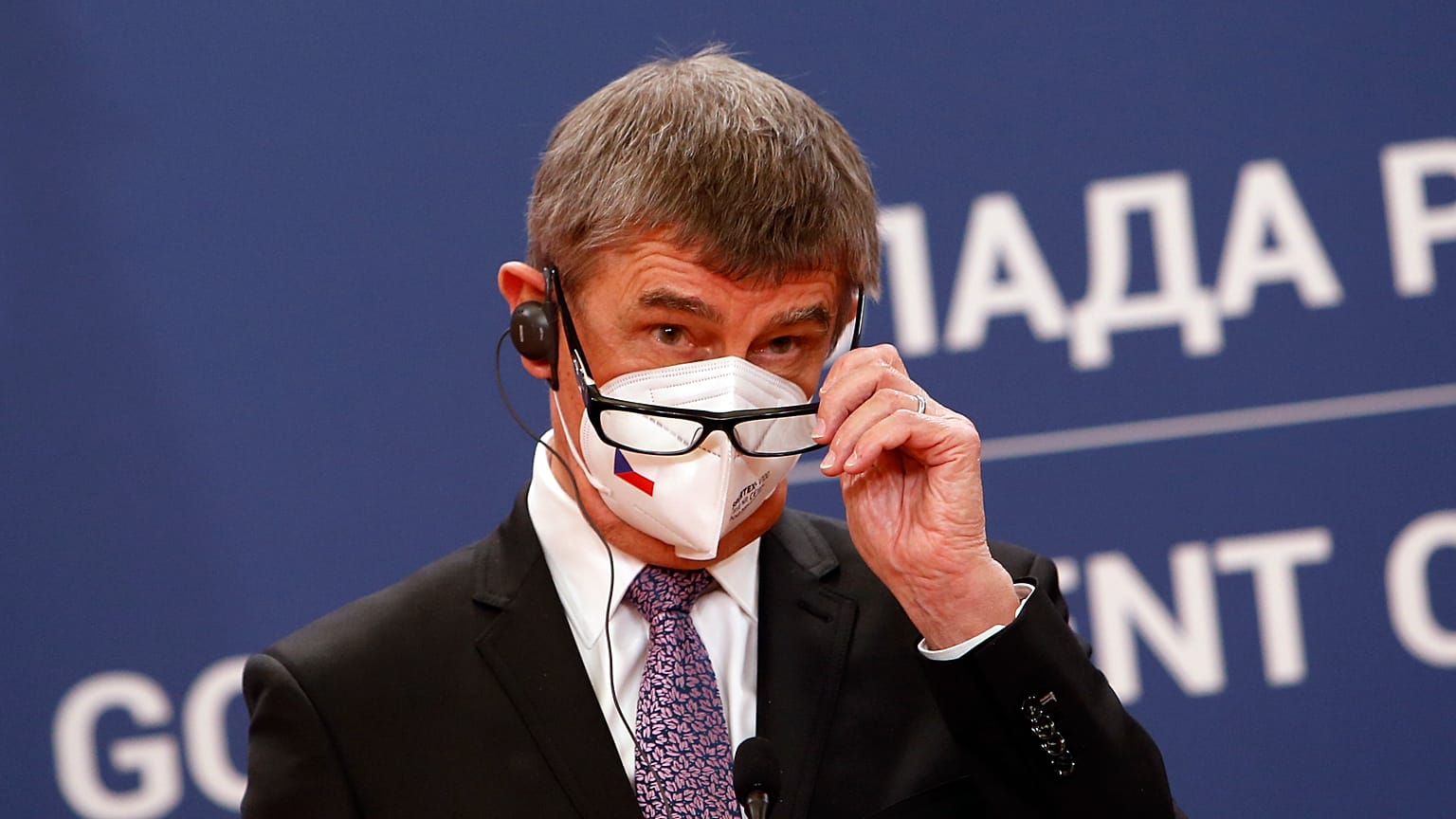Central European neighbours Slovakia and Hungary have already taken delivery of Russia's Sputnik V jab.
The Czech Republic looks likely to be the latest European Union country to break with the bloc’s centralised scheme of vaccine distribution and take deliveries of COVID-19 inoculations from Russia and China.
 ADVERTISEMENT
ADVERTISEMENT
 ADVERTISEMENT
ADVERTISEMENT
Czech President Milos Zeman, who has long campaigned for a pro-Russia and pro-China foreign policy, said he had written to Russian President Vladimir Putin to ask for a batch of Russia’s Sputnik V vaccine.
He estimated the vaccines might be ready for delivery to the Czech Republic “within days”.
On Wednesday, Jiri Ovcacek, a spokesman for Zeman, confirmed to the media the president had also written to his Chinese counterpart, Xi Jinping, to request delivery of Sinopharm vaccines, at the request of Prime Minister Andrej Babis.
Later in the day, Ovcacek wrote in a statement that “according to a report from the Czech embassy in Beijing, the Chinese side has decided to immediately meet this request”.
How hard is COVID-19 hitting the Czech Republic?
The Czech Republic currently has one of the world’s worst per-capita rates of new daily infections, at more than 12,000 new cases on March 3 and still rising. Many hospitals in major cities are now at maximum capacity, while several areas of the country have been isolated because of localised outbreaks.
On March 1, the country went into its most stringent lockdown since March 2020, at the beginning of the pandemic, and the government has drafted in the military to enforce compliance with strict restrictions on free movement.
Babis, known for his Eurosceptic positions, has frequently lashed out at Brussels for its lack of assistance during the pandemic, especially over the vaccination distribution campaign, which has been roundly criticised across the bloc.
As of March 2, only 702,000 people had received at least one dose of vaccination in the Czech Republic, or 4.3% of the population, compared to around 6% in neighbouring Slovakia and 5.2% in Germany, according to Our World In Data.
Will Prague use Sputnik V before European regulators approve it?
Euronews contacted the Czech Republic's ministry of health but it was unable to respond to question about whether the Russian and Chinese vaccines can be legally administered in the country.
The EU’s drug regulator, the European Medicines Agency (EMA), has not yet approved Russia’s Sputnik V nor China’s Sinopharm jabs. On Thursday it said a review of Sputnik V had now got underway.
It is believed that both Zeman and Babis last week agreed that any vaccines administered in the country would need to be first approved by the EMA.
In early February, Babis said that the government may buy the Sputnik V vaccines but then wait for the European regulator’s permission before roll-out.
However, at the weekend Babis intimated that approval by the Czech Republic's local drug regulator, the State Institute for Drug Control (SUKL), would be sufficient.
But a health ministry spokesperson told the media on Wednesday that it would not grant exemptions to vaccines that hadn’t been approved by the EMA, as costs would not be covered by insurance companies.
This potentially opens up a new source of conflict between the prime minister and the health ministry, which have clashed frequently throughout the pandemic.
In January, Hungary bypassed the EMA when its own regulators approved the Sputnik V vaccine and now expects to receive 3 million doses by June. It also approved China’s Sinopharm vaccine. Austria also reached out to Moscow on Friday about procuring its vaccines, while Slovakia received the first tranche of an eventual 2 million doses from Russia on Monday.
China and Russia a powder-keg issue in the Czech Republic
In the Czech Republic, where public trust in the government’s handling of the pandemic is low and where almost half of the respondents to a survey last month said they wouldn’t stay at home even if they had COVID-19 symptoms, employing unapproved vaccines may escalate distrust in the authorities.
“A large part of the Czech public is concerned by untransparent efforts of President Zeman and PM Babis to import and make use of Russian and Chinese COVID vaccines without EMA authorisation,” Pavel Telicka, a former Czech politician, EU Commissioner, and a vice-president of the European Parliament, tweeted on Wednesday evening.
The government and President Zeman stress that receiving vaccines from Russia and China are not political.
“Vaccines have no ideology,” Zeman said during a press conference last weekend.
But any dealing with authoritarian China and Russia is a powder-keg issue in the Czech political arena. Many liberals see opposing these authoritarian regimes as a way of burnishing the legacy of the country’s past anti-communist leaders, including the political icon Vaclav Havel. From the 2000s onwards, particularly those on the political right saw better relations with China and Russia as a way of boosting economic growth as well as opposing the establishment’s pro-US and pro-EU foreign policy.
Since 2018, the mayor of Prague, Zdenek Hrib, from a libertarian opposition party, has frequently pursued anti-China policies, including ending the capital’s sister-city relationship with Beijing and replacing it with an agreement with Taipei, the capital of Taiwan.
Tensions heightened further in September last year when the president of the Czech Senate, Milos Vystrcil, made a formal visit to Taiwan. Speaking whilst in Berlin, China’s Foreign Minister Wang Yi said the Czech Republic would pay a “heavy price” for the visit.
A Pew Research Center poll in 2017 found Czechs had the second-worst opinion of China among Europeans, beaten only by the Swedes. A more recent survey, organised by the Sinophone Borderlands project of Palacky University Olomouc, found Czechs are among the most polarised in Europe over relations with China. However, the same survey also noted that the majority of Czechs thought that China did more to help the country during the pandemic than the EU, one of the few European states to show this discrepancy.
Deepening divisions over China
With the likely arrival of vaccines from China, “the president and politicians who have invested in positive relations with China will highlight this as an example of how useful it has always been to have good contacts with China,” said Richard Q Turcsanyi, programme director at Central European Institute of Asian Studies at Palacky University Olomouc.
On the other hand, he added, the opposition will be highly critical of this move, together with most of the media, and civil society.
“In the end, this will further deepen divisions in the Czech society when it comes to China - which are already the largest in Europe,” Turcsanyi added.
Ivana Karaskova, a China research fellow and a project coordinator at the Association for International Affairs (AMO), a Prague-based think tank, said that vaccine diplomacy provides a “great opportunity” for Beijing to improve its image in Central and Eastern Europe.
The fact that China will deliver vaccines to the Czech Republic, despite their public disputes over the past twelve months, signifies how well China is aware that it is losing ground in the region, she added.
Despite the risks of Chinese and Russian-made vaccines inflaming political tensions, it may be a risk worth taking for Babis and his ANO party, which rules as part of a minority government with the Social Democrats (CSSD), analysts say.
“It is an election year and Babis is desperate,” said Karaskova, referring to a general election set to take place in October.
At the moment, ANO’s popularity is slipping. The Centre for Analysis and Empirical Studies (SANEP), a local pollster, found its support fell from 27.1% in January to 26.8% in February, although this still puts it on track to win October’s general election. However, the Social Democrats’ popularity is waning even quicker, raising major questions over whether ANO would be able to form a minority government again after October’s ballot.
With informal campaigning already underway, the likely arrival of Chinese and Russian vaccines will become another major talking point.
ANO’s main challenger for now is a new alliance between the libertarian Pirate Party and the liberal Mayors and Independents (STAN) group. It is gaining support. The Pirates, which include the Prague Mayor Hrib, have taken the most stringent of anti-Beijing positions. The centre-right Civic Democratic Party (ODS), which also agreed recently to a new electoral pact, has also campaigned heavily against closer relations with China and Russia.
Every weekday at 1900 CET, Uncovering Europe brings you a European story that goes beyond the headlines. Download the Euronews app to get an alert for this and other breaking news. It's available on Apple and Android devices.















